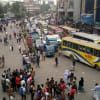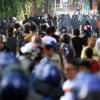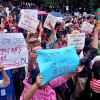On 16 July, 2024, Abu Sayed – a bright student of Rangpur's Begum Rokeya University – was tragically shot dead by the police in broad daylight. With his arm stretched out, he posed no threat to law enforcement. Then why was he shot? Is this the price we have to pay to speak our minds? These questions have been haunting me since the day violence was unleashed upon the students because of the quota reform protests.
Following a directive from the University Grants Commission of Bangladesh (UGC), our classes have been suspended indefinitely. I have been living in fear, praying for the safety of my fellow students who are out on the streets protesting. Is the violence necessary? Couldn't the government have addressed the issue through open discussions?
"The government could have better handled the situation," opines Asif, a master's student at a private university. "I feel distressed by the overall situation. Violence against students is in no way justified, and political agendas should not interfere with the quota reform movement."
The recent escalation of violence during these protests has not only raised serious concerns about law enforcement and student safety, but has also cast a long shadow over the mental health of the students involved.
The violent confrontations, which led to the needless death of students like Abu Sayed, have far-reaching impacts beyond physical injuries – they deeply affect the psychological well-being of all students witnessing or participating in these events.
"Every time I watch the news, there's a palpable fear that some of the protesting students might not return. This breaks my heart. I want an end to the violence," shares Hamida, a freshman at a public university.
The psychological trauma associated with such violent protests can lead to conditions like post-traumatic stress disorder (PTSD), anxiety, and depression. Witnessing or surviving violent incidents leaves a lasting impact on students, manifested through nightmares, severe anxiety, and uncontrollable thoughts about the events.
"It's like being trapped in a never-ending nightmare. The law enforcers showed mercy to no one – not even the ones who were hurt," comments Rahim, who participated in the protest.
Furthermore, there is the issue of trust – both in law enforcement and the institution itself. When students see their peers harmed by the very authorities meant to protect them, it can lead to a palpable breakdown in trust, which we all have witnessed for the past few days.
This disillusionment can foster cynicism and a lack of respect for governance and law, which can perpetuate a cycle of unrest and dissatisfaction. Additionally, the mental toll of harbouring such feelings can lead to alienation and isolation, further impacting students' mental health and their perceptions of their role within society.
Our campuses, which are meant to be safe havens for learning and development, have transformed into battlegrounds where students feel threatened not just by the possibility of physical harm, but also by the psychological stress of navigating such an environment.
Is this the Bangladesh we dreamed of? At the end of the day, we are suffering as a nation – both physically and psychologically.
The violence that has overshadowed the quota reform protests must be a catalyst for change, urging all stakeholders – both students and the government – to foster an environment of understanding and reform. The solutions unquestionably lie in collaborative efforts, empathetic governance, and an unwavering commitment to uphold the rights and safety of students.
*Names have been changed to protect their identities.








Comments